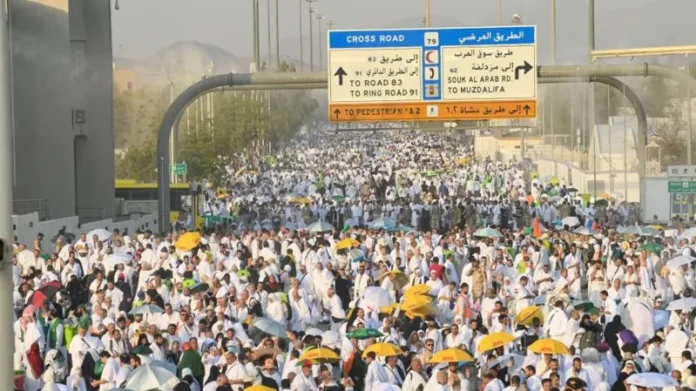In one of the deadliest Hajj pilgrimages in recent memory, Saudi Arabia has confirmed the deaths of at least 1,301 individuals during this year’s annual pilgrimage to Mecca.
The tragic toll, predominantly among unauthorized pilgrims enduring scorching temperatures exceeding 50 degrees Celsius (122 degrees Fahrenheit), has sparked widespread concern and criticism regarding safety measures for participants.
Hajj, a sacred obligation for physically and financially capable Muslims, drew approximately 1.8 million pilgrims this year to Islam’s holiest site.
The journey, undertaken amid a punishing heatwave, proved fatal for many who lacked official permits and were left vulnerable to the harsh conditions without adequate shelter or provisions.
According to Saudi Arabia’s official news agency, SPA, more than three-quarters of the deceased were unregistered pilgrims who had embarked on the pilgrimage under the blazing sun, often elderly or chronically ill.
Health Minister Fahd Al-Jalajel expressed condolences to the families of those who perished and acknowledged efforts to educate pilgrims about the risks of heat stress.
Efforts to manage the health impact of the pilgrimage were extensive, with health facilities attending to nearly half a million pilgrims, including over 140,000 without permits.
Many pilgrims suffered from heat exhaustion, with some still hospitalized as a result.
The extreme temperatures, recorded as high as 51.8 degrees Celsius in Mecca, underscored the challenges faced by pilgrims, particularly those without access to air-conditioned tents and official transportation.
Critics have pointed to Saudi Arabia’s responsibility to ensure the safety of all pilgrims, regardless of their permit status.
International reactions have highlighted the scale of the tragedy, with various countries reporting significant losses among their citizens. Egypt mourned 658 deaths, while Indonesia and India reported over 200 and 98 fatalities, respectively.
Pakistan, Malaysia, Jordan, Iran, Senegal, Sudan, and Iraq’s Kurdistan region also confirmed deaths among their nationals.
In response to the crisis, several governments have taken action against those responsible for facilitating unauthorized pilgrimages. Egypt’s Prime Minister Mostafa Madbouly revoked licenses from 16 tourism companies and referred their managers for prosecution.
Jordan detained travel agents involved in unofficial pilgrimages, and Tunisia’s President dismissed the minister of religious affairs amid public outcry.
The allocation of Hajj permits operates on a quota system distributed through a lottery, reflecting the high demand among Muslims worldwide.
However, the steep costs associated with the pilgrimage often drive individuals to attempt the journey without proper authorization, risking legal consequences if caught by Saudi authorities.
Ahead of the Hajj, Saudi Arabia had undertaken measures to remove hundreds of thousands of unauthorized pilgrims from Mecca, aiming to ensure the safety and manageability of the pilgrimage.
Despite these efforts, the tragic loss of life has highlighted ongoing challenges in safeguarding all pilgrims during this deeply significant event in the Islamic calendar.
As the global Muslim community mourns the victims and demands accountability for the lapses in safety measures, the aftermath of this year’s Hajj will undoubtedly prompt reflections on how future pilgrimages can be made safer and more inclusive for all participants.
This article was created using automation technology and was thoroughly edited and fact-checked by one of our editorial staff members

